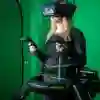



Create video games, write stories and gain key employability skills for one of the U.K’s fastest growing creative industries on this Games Design and Creative Writing Degree.
Our programme encourages you to create cutting-edge games and craft unforgettable narratives through mastery of a technical skillset and an immersive approach to story. Join the No. 1 community for student satisfaction and develop your unique style through Game Jams, Open-Mics and Student-Led Literary magazines.
Join our exciting, unique programme that opens doors to a vast array of employment opportunities and develop your creativity and craft to industry-standard and beyond.
About this course
Games Design and Creative Writing are a perfect pairing – you need both to create successful games, best-selling narratives and interactive storytelling.
Learn from experts who’ve worked on BAFTA-winning games and led projects across Europe, while getting hands-on experience with industry-standard facilities. You’ll have access to cutting-edge technology including our Virtual Reality lounge, complete with Virtuix Omni VR Treadmill and fully equipped Mac and PC labs with the latest digital media software.
You’ll hone your narrative craft through practical workshops and open discussions, taking advantage of the welcoming and student-focused community. Develop key skills to enhance your writer’s approach and experiment with genre, form & style as you create unique and exciting narratives, from Fantasy and Science Fiction to scripts and short stories, poems and non-fiction.
Our classes focus on co-creation and the student voice. You’ll collaborate with students across a range of disciplines, honing your skills in communication, problem-solving and teamwork. You’ll workshop projects with your peers, deepening your skills through peer-support and regular feedback to hone your craft and skillset with each class.
With our strong industry connections, you’ll enjoy study trips, guest lectures and writing challenges. Get involved beyond the classroom by joining the Game Republic’s annual Student Showcase to present your work to top employers, and design, edit & publish your writing in our student-led magazine Document 1.
Play your part in tomorrow's world today
Module options
Each year, you’ll study modules worth a certain number of credits, and you need 120 credits per year. Most modules are 20 credits – so you’ll study six modules each year. Some longer modules, such as a dissertation, are worth more. In these cases, you’ll study fewer modules - but the number of credits will always add up to 120. Some modules are compulsory, some are optional, so you can build a course that’s right for you.
Filters
Critical Studies Project
In order to create innovative and original game experiences, it’s important to understand where games came from and the current landscape of the games industry.
In this module you will explore the historical, social and political contexts of games, play and design. We’ll look at how to analyse games, how games get made, the people that make them and games from a consumer perspective.
The module will perform analysis on video games and its industry including topics such as gender, representation, misogyny in video games, Law, ethics, regulation and censorship. will consider sustainable game development practices and generate original concepts for game designs that could “change the world”.
compulsory
20 credits
Facts into Art
Discover how to convert real life into good storytelling. Extend your creative writing skills by generating ideas from daily life, and crafting them into well-conceived, skilled pieces.
compulsory
20 credits
Game Design & Prototyping
Ready to start turning your game ideas into reality and build the foundation for a career in game design? Then this is the module for you.
You’ll cover key principles like game objects, rules, mechanics, goals and conflict.
You’ll learn to apply these concepts by developing your own game ideas and bringing them to life in engines like Unity and Unreal.
With hands-on experience you'll build environments, prototype mechanics, and learn essential scripting skills.
You’ll also dive into production tools like iterative design and documentation. Giving you the skills to create and manage your own game projects.
Take the first step toward shaping the future of gaming today.
compulsory
20 credits
Introduction to Game Audio
The creation and implementation of effective audio is central to game design –supporting dramatic story-telling, immersion, interactivity, game mechanics, as well as emotional and physiological engagement. In this module you will explore some of the creative and technical challenges faced when designing and implementing game audio. The knowledge and skills you acquire in this module will help you to use audio more effectively in your own game projects and will inform future collaborative work with audio practitioners and interdisciplinary creative teams.
compulsory
20 credits
Poetry, Performance, Play
Do you love the sound of words, the rhythm of poetry and the power of the human voice? Then this module is for you. Join us to learn how to craft your words into shape as you play with form and perform your own monologues, sonnets, haiku and more, letting your words travel out through the dark.
compulsory
20 credits
The Writer’s Toolkit
The Universe is made of stories, not of atoms’ – Muriel Rukeyser. This module will help you to nourish the writer within you, and introduce you to the key concepts that will allow your imagination to flourish through writing exercises, workshops and advice from published writers.
compulsory
20 credits
Scriptwriting
Want to see your story come to life on stage or screen? This module is your chance to make it happen.
You’ll dive into key elements like story, plot, character development, dialogue, structure, and adaptation.
You'll hone your skills in giving and receiving feedback, refining your craft, and growing as a writer.
You’ll work closely with other creatives, sharing ideas, inspiring each other and pushing one another to reach your full potential.
By the end, you'll have the tools and experience to turn your ideas into powerful scripts that can captivate audiences. Ready to bring your story to life? So are we.
core
20 credits
Collaborative Game Project
Choose your own specialism and work with other students from various disciplines as you work together to develop a complete game project. The module presents the opportunity to learn from one another, to develop new skills and apply fresh approaches. Practice important skills such as team work, project management and communication as you work collaboratively to produce a high quality game project that can be used as a portfolio piece upon graduation.
core
40 credits
The Storyteller’s Art
Write your own tales of transformation and adventure, drawing on the world’s greatest stories studied in this module.
optional
20 credits

The end of your story is just the beginning
Featured module
- core
- 20 credits
Want to see your story come to life on stage or screen? This module is your chance to make it happen.
You’ll dive into key elements like story, plot, character development, dialogue, structure, and adaptation.
You'll hone your skills in giving and receiving feedback, refining your craft, and growing as a writer.
You’ll work closely with other creatives, sharing ideas, inspiring each other and pushing one another to reach your full potential.
By the end, you'll have the tools and experience to turn your ideas into powerful scripts that can captivate audiences. Ready to bring your story to life? So are we.
Our facilities


Watchlist
Dr Ed Hurst
Course overview
2 mins
Student showreel
Course Highlight
3 mins
Featured academics
Study under experts who’ve worked on BAFTA-winning games and titles for Disney and Lucasfilm, alongside innovative authors and writers of fiction, non-fiction, poetry, fantasy and science fiction.
You’ll be taught be enthusiastic, expert staff who are gamers and storytellers as much as they are academics. Our lecturers have a diverse range of experience, from digital media and games design, to publishing and social media.

Stuart Lilford
Programme Director & Lecturer
Stuart began his career in the games industry before moving into teaching. He worked on three BAFTA-winning games and at prestigious companies such as Rare and Codemasters. He develops games independently, including the award-winning Time Stone.

Dr Edmund Hurst
Lecturer
A novelist and published author, Dr. Edmund Hurst’s focus is on Genre Fiction. Interested in Fantasy and Science Fiction, he achieved his PhD for the thesis: 'Dawnsmoke and the Influence of Character Tropes on the Construction of Fantasy Fiction.'
Entry Requirements
What do I need?
This course is currently available through Clearing, which means our entry requirements are a bit different to what they would normally be.
At Hull, you're a name not a number. During Clearing, we look at all of your qualifications and experience, not just your academic grades. We may be able to offer you a place whatever your situation. Get started by completing our eligibility checker, and find out immediately if you could study at the University of Hull.
Have questions? Our admissions team will be happy to help.
Fees & Funding
How much is it?

Future prospects
You’ll graduate ready for a range of exciting careers in the games industry and creative sector.
You’ll develop the essential skills that are needed in the rapidly growing game sector, as well as a professional-standard portfolio of both games and written work to showcase your unique abilities and key career prospects.
With transferrable skills such as communication, problem solving and collaboration, you’ll have the essential attributes graduates need to get into the creative industries. You’ll develop analytic and creative thinking, alongside resilience, motivation and curiosity – all skills prized by employers across the globe.
Our students have gone on to successful careers in games design, creative writing and multimedia production with roles including game designer, 2D or 3D artist, VFX artist, scriptwriter, publishing assistant, publicity and marketing.
The ability to showcase a creative mind through writing is a rare skill. Being able to tailor your messaging for different audiences will also give you a powerful advantage. Especially if you combine your professional portfolio with job-ready skills gained from work experience.
Become part of the next generation of futuremakers
Like what you've seen? Then it's time to apply.
The standard way is to apply through UCAS. This will give you the chance to showcase your skills qualities and passion for the subject, as well as providing us with your academic qualifications.
Not ready to apply yet?
Visit our next Open Day, and see all that the University of Hull has to offer. Talk to our lecturers about your subject, find out what university is really like from our current students, and take a tour of our beautiful campus and amazing facilities.
You may also be interested in...
94% employability (Screen) UK domicile full-time first degree leavers; Higher Education Graduate Outcomes statistics, for the academic year 2022/23, published by the Higher Education Statistics Agency June 2025.
Creative Writing is ranked in 1st place for Student Satisfaction (out of 50 institutions.) Complete University Guide 2025.
All modules presented on this course page are subject to availability and this list may change at any time.